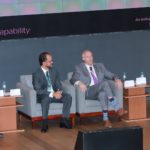How to change peoples’ behavior through financial education
How peoples’ behavior affects the economy and how their conduct can be educated so they can aspire to a better present and future wellbeing. That was the central idea of the panel Behavioral economics and financial education, moderated by Jorge Sicilia, director of BBVA Research. The participants included Josh Wright, executive director of Ideas 42; Carlos Ramírez, chairman of the National Commission for Retirement Savings of Mexico and Hugo Ñopo, senior researcher at the Group for the Analysis of Development (GRADE).

It´s the battle between the “quick brain” and the “slow brain”. About how impulsive, precipitated thinking can overtake slow and rational thought when making an economic or financial decision. When the “quick brain” acts, the consequences can be very negative, and not just for the pocketbook: more importantly, they can also affect our future wellbeing. Because it´s not just a question of our impulses causing us to pay a higher fee for the gym, even though later we don´t use it. If the “quick brain” wins out, we may repent years later, when we realize that we haven´t saved for our retirement.
One data point: 40% of marriages end in divorce. But when married couples are asked, in their happiest moments, if they think they will end up getting divorced, none of them answer “yes”. This is the example given by Josh Wright to show the excess of confidence people have in their good or happy moments.
Wright is executive director of Ideas 42, a consultancy that was born as an I&D laboratory for social sciences at Harvard University, with the goal of applying scientific methods of psychology and economy to peoples’ personal financial decisions. Its research has discovered new solutions in areas such as financial access for the poor, collection technologies in developing countries, health coverage in the United States and access to education in underprivileged communities.
Wright´s conclusion is that people tend to overestimate their financial knowledge. That predisposition distorts their financial capabilities and, as a result, their personal economic and financial decisions. However, Wright warns: financial education by itself will not change peoples’ conduct. “We should motivate the change by using heuristic principles”.
The term heuristic is understood as a practical procedure for solving problems. In this case, it has to do with understanding the consumers, in order to design products according to their needs. In the experience of Idea42 financial heurists improve peoples’ financial decision-making in practice, allowing them to increase their income and encouraging savings.
Carlos Ramírez, chairman of the National Commission for Retirement Savings of Mexico (CONSAR), the government agency that promotes retirement savings in Mexico, explained the reality of his country as regards workers’ savings for their retirement and the future scenario for pensions.
According to data Ramirez provided during his speech, only four out of ten Mexicans save for their retirement. And of the 57 million Mexican workers that contribute to the social security system, 39 million don´t make any (voluntary) contribution to the Retirement Savings System.
The future scenario is certainly worrying: if in the coming years, things don´t change, upon retirement a Mexican worker will receive a pension equivalent to 30% of his/her salary. And with that amount of money, it will be very difficult to pay for their vital needs.
Ramírez explained that CONSAR is struggling against a form of behavior that is deeply rooted in Mexican life - of living life day to day, taking care of the present and not worrying about the future. ”The economics of behavior is necessary in order to be able to incentivize savings and promote behavioral changes”, he said.
To put this theory into practice, the National Commission for the System of Retirement Savings has launched a series of initiatives to facilitate contributions to retirement plans. Among the most striking, are the accords it has reached with convenience chain stores and pharmacies, so that Mexican workers can make small contributions to their pension funds in these establishments, simply by going to the cash register and saying how much they want to deposit. The store takes care of the process.
Ramírez said that public and private institutions should work together to change the conduct of people regarding their retirement. “Financial education has to be a common objective. Because increasing financial capacities means increasing the wellbeing of people”, he stressed.
Carlos Ramírez (CONSAR): “Financial education has to be a common objective. Because increasing financial capacities means increasing the wellbeing of people”
Hugo Ñopo, chief researcher of the Group for the Analysis of Development (GRADE) of Peru also talked about the reality of his country, where only one in four adults has a savings account, two of every three do not have access to the financial system and young people show an increasing rejection of the financial system.
Ñopo called attention to the fact that in Peru, “people are conscious of the importance that savings has, but that doesn´t mean they pay it the necessary attention”. For the GRADE researcher, the solution lies in “improving trust as a fundamental element to promote savings within the financial system”.
The GRADE representative shared the other panelists’ view that financial education alone was not enough. “It´s necessary to find the right moment to disseminate this type of knowledge”, he said. Another of the keys, in his opinion, is to insist on the message “Reminders are very important because behaviors are conditioned by habits”, he said.
And changing habits is an long-term task. But almost never impossible.
At the BBVA Center for Financial Education and Capability you will find all relevant information on financial education in the world.